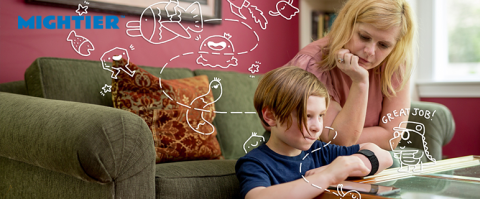
In 2015, a three person team at Boston Children’s Hospital set out to help the estimated 20 percent of children struggling with emotional regulation, which often shows up as anxiety or outbursts. That team grew into a stand-alone company called Mightier, a startup that produces modified video games that help children develop skills to regulate their behavior and emotions.
We recently sat down with Trevor Stricker, one of the founding members of Mightier, to get a better understanding of their product and how it could change our approach to behavioral health. During the interview, Stricker noted how Massachusetts played a unique role in forming their company.
“Massachusetts has an interesting combination of a thriving tech industry and community, but with a population that’s pretty open to what we are doing,” said Stricker.
Like many other companies in the MassDigitalHealth ecosystem, Stricker and his team are tackling a challenge that is global in scope - children’s behavioral health - and utilizing innovative technologies in a novel way to address this challenge, building on the region’s deep healthcare and tech expertise.
What is the problem you are addressing?
Most kids who suffer from a behavior issue like ADHD, or who have trouble managing their emotions, are very aware of their problem and they want to improve, but they are not sure how. Kids also like video games. What we do is magnify the natural frustration that kids feel playing video games. We take the parts where kids experience difficulty and make them more difficult. We’re frustrating them in a low stakes situation and they learn how to manage it in a way that will stick with them for the rest of their lives.
How does this help kids?
Our games strengthen the mind-body connection. Our games are not just something you can throw at kids and poof! they’re cured. In order for our approach to work, we work with families to establish a routine and help them learn how to talk with their children. Kids learn to adjust their behavior in the setting of a video game and they take that into the real world.
How does this fit into the other forms of treatment that are out there?
When you compare this with medication, there's one big difference: no side effects. Medication has toxicity, liver issues, etc. When you stop taking it, you go back to baseline. It doesn’t teach you anything. MGH did a study where they followed up with Mightier users and found that the effects of Mightier lasted 90 days after they stopped using it. The other factor we are addressing is accessibility. There just aren’t enough mental health professionals to serve this population. Your kids are already playing video games. This just puts them to work and makes treatment a much more accessible option.
What is the biggest problem your company has faced since setting up shop?
Scaling, certainly. To grow, we need to be credible. Getting credibility is a two part question for us: families and professionals. To professionals our science speaks very loudly. For families, it takes more. This isn’t snake oil; it doesn’t work instantly. It’s not like your kid plays a game for ten minutes and their issues are solved. It takes time. We often tell people just let them play. Don’t beat them over the head. Then we have to walk people through the program. We have to help them find the signs. You see their kid take a deep breath while playing Mightier. That’s a sign.
Is Massachusetts the place to be for what you’re trying to do?
I think this the place to be. Massachusetts has an interesting combination of a thriving tech industry and community, but with a population that’s pretty open to what we are doing. Just the fact that I don’t have to convince you what we are doing has merit. We’re doing something very counterintuitive: we’re helping kids mental health with video games and the fact we aren’t laughed at is a win in some way.
What are the pressing workforce needs for your firm?
It’s been hard to hire for two specific roles: data scientists and game developers There’s not a lot of them anywhere. The game industry is five times the size it was ten years ago and the number of people with experience has not kept pace.
Where are you finding reception for your idea and where are you finding push back?
We’re doing something very counterintuitive: we’re helping kids’ mental health with video games. The fact that we aren’t laughed at is a win in some way. We’ve approached all the communities here and found receptive audiences. Part of that is we have a foundation of science. There’s a lot of credibility to what we are doing. If somebody wants to kick the tires and make sure our claims are true, they can.
Mightier has completed studies with Boston Children’s Hospital that have shown their product lowers parental stress by nearly 20%, reduces outbursts by 62% and decreases opposition behaviors by 40%. You can read more of the science behind Mightier here.
